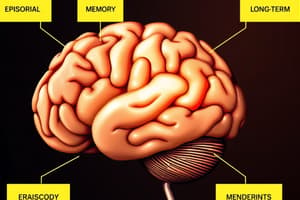Podcast
Questions and Answers
What is the primacy effect in memory recall?
What is the primacy effect in memory recall?
- Better recall of words early in a list (correct)
- Better recall of words that are newly learned
- Better recall of words from long-term memory
- Better recall of words in the middle of a list
Which stage of long-term memory involves the maintenance of information?
Which stage of long-term memory involves the maintenance of information?
- Retrieval
- Retention (correct)
- Consolidation
- Acquisition
What role does sleep play in memory retention according to the provided information?
What role does sleep play in memory retention according to the provided information?
- It prevents the formation of new memories
- It directly improves short-term memory capacity
- It helps to forget unnecessary information
- It enhances memory strengthening through targeted cues (correct)
In Smith & Weeden's (1990) clock experiment, which group was expected to perform better on the logic task after sleep?
In Smith & Weeden's (1990) clock experiment, which group was expected to perform better on the logic task after sleep?
What is consolidation in the context of long-term memory?
What is consolidation in the context of long-term memory?
What characterizes long-term memory compared to short-term memory?
What characterizes long-term memory compared to short-term memory?
What is a primary purpose of rehearsal in memory processes?
What is a primary purpose of rehearsal in memory processes?
Which of the following is NOT one of the proposed control processes by Atkinson & Shiffrin?
Which of the following is NOT one of the proposed control processes by Atkinson & Shiffrin?
What is the function of coding in long-term memory processes?
What is the function of coding in long-term memory processes?
What is the primary function of place cells in the hippocampus?
What is the primary function of place cells in the hippocampus?
How does long-term memory differ in its forgetting rate compared to short-term memory?
How does long-term memory differ in its forgetting rate compared to short-term memory?
Which strategy is often used as a mnemonic device to aid memory?
Which strategy is often used as a mnemonic device to aid memory?
Which of the following best describes semantic memory?
Which of the following best describes semantic memory?
Which of these statements regarding long-term memory is false?
Which of these statements regarding long-term memory is false?
How is semantic memory thought to be stored in the brain?
How is semantic memory thought to be stored in the brain?
What type of amnesia did Patient H.M. experience after his surgery?
What type of amnesia did Patient H.M. experience after his surgery?
What is the primary focus when studying long-term memory?
What is the primary focus when studying long-term memory?
What aspect of memory was primarily studied through Patient H.M.'s case?
What aspect of memory was primarily studied through Patient H.M.'s case?
Which example best illustrates semantic memory?
Which example best illustrates semantic memory?
What is retrograde amnesia?
What is retrograde amnesia?
What remained intact for Patient H.M. after his surgery?
What remained intact for Patient H.M. after his surgery?
What is the purpose of mnemonics in the context of memory retention?
What is the purpose of mnemonics in the context of memory retention?
What does the serial position effect refer to?
What does the serial position effect refer to?
Which of the following best describes the primacy effect?
Which of the following best describes the primacy effect?
How does visualization aid in memory retention according to the content?
How does visualization aid in memory retention according to the content?
Which statement about the recency effect is accurate?
Which statement about the recency effect is accurate?
What strategy involves associating visual images with information to enhance memory?
What strategy involves associating visual images with information to enhance memory?
Which of the following phrases accurately represents the mnemonic for star spectral classes?
Which of the following phrases accurately represents the mnemonic for star spectral classes?
Which of the following scenarios is an example of the serial position effect?
Which of the following scenarios is an example of the serial position effect?
What is procedural memory primarily associated with in the brain?
What is procedural memory primarily associated with in the brain?
What type of memory allows retrieval of information based on related cues?
What type of memory allows retrieval of information based on related cues?
Which of the following disorders is linked to damage in procedural memory networks?
Which of the following disorders is linked to damage in procedural memory networks?
Which brain structure is primarily involved in emotional associative memory?
Which brain structure is primarily involved in emotional associative memory?
What process describes a decrease in response to a repeated, neutral stimulus over time?
What process describes a decrease in response to a repeated, neutral stimulus over time?
What is the main difference between associative memory and non-associative memory?
What is the main difference between associative memory and non-associative memory?
Which type of procedural task is likely to be affected by damage to the basal ganglia?
Which type of procedural task is likely to be affected by damage to the basal ganglia?
What is sensitization in the context of non-associative memory?
What is sensitization in the context of non-associative memory?
What is anterograde amnesia characterized by?
What is anterograde amnesia characterized by?
What does temporally graded amnesia imply about memory loss?
What does temporally graded amnesia imply about memory loss?
According to the Standard Model of Declarative Memory, where are fully consolidated memories stored?
According to the Standard Model of Declarative Memory, where are fully consolidated memories stored?
What is a key observation that led to the Multiple Trace Theory?
What is a key observation that led to the Multiple Trace Theory?
What process occurs when older memories are recalled according to Multiple Trace Theory?
What process occurs when older memories are recalled according to Multiple Trace Theory?
What happens during the process of memory reconsolidation?
What happens during the process of memory reconsolidation?
What does the ongoing debate surrounding memory theories suggest?
What does the ongoing debate surrounding memory theories suggest?
What mnemonic is suggested to help understand the process of memory storage?
What mnemonic is suggested to help understand the process of memory storage?
Flashcards
Long-Term Memory (LTM)
Long-Term Memory (LTM)
Memory with no capacity limits, lasting from minutes to a lifetime.
Atkinson & Shiffrin (1968) Model
Atkinson & Shiffrin (1968) Model
Early model proposing LTM as a single storage with control processes.
Rehearsal
Rehearsal
Repeating information to keep it in short-term memory.
Coding
Coding
Signup and view all the flashcards
Semantic Elaboration
Semantic Elaboration
Signup and view all the flashcards
Mnemonics
Mnemonics
Signup and view all the flashcards
Rote Learning
Rote Learning
Signup and view all the flashcards
Control Processes
Control Processes
Signup and view all the flashcards
Primacy Effect
Primacy Effect
Signup and view all the flashcards
Recency Effect
Recency Effect
Signup and view all the flashcards
Consolidation
Consolidation
Signup and view all the flashcards
Sleep and Memory
Sleep and Memory
Signup and view all the flashcards
Memory reactivation
Memory reactivation
Signup and view all the flashcards
Stellar Classification Mnemonic
Stellar Classification Mnemonic
Signup and view all the flashcards
Imaging (Memory)
Imaging (Memory)
Signup and view all the flashcards
Imagery (Memory)
Imagery (Memory)
Signup and view all the flashcards
Serial Position Effect
Serial Position Effect
Signup and view all the flashcards
Rundus (1971)
Rundus (1971)
Signup and view all the flashcards
Place Cells
Place Cells
Signup and view all the flashcards
Hippocampus
Hippocampus
Signup and view all the flashcards
Semantic Memory
Semantic Memory
Signup and view all the flashcards
Episodic Memory
Episodic Memory
Signup and view all the flashcards
What type of memory is 'knowing' that a potato is a vegetable?
What type of memory is 'knowing' that a potato is a vegetable?
Signup and view all the flashcards
Patient H.M.
Patient H.M.
Signup and view all the flashcards
Anterograde Amnesia
Anterograde Amnesia
Signup and view all the flashcards
Retrograde Amnesia
Retrograde Amnesia
Signup and view all the flashcards
Temporally Graded Amnesia
Temporally Graded Amnesia
Signup and view all the flashcards
Standard Model of Declarative Memory
Standard Model of Declarative Memory
Signup and view all the flashcards
Hippocampus Role in Memory
Hippocampus Role in Memory
Signup and view all the flashcards
Multiple Trace Theory
Multiple Trace Theory
Signup and view all the flashcards
Memory Reconsolidation
Memory Reconsolidation
Signup and view all the flashcards
Episodic Memory (Reconsolidation)
Episodic Memory (Reconsolidation)
Signup and view all the flashcards
Non-Declarative Long-Term Memory
Non-Declarative Long-Term Memory
Signup and view all the flashcards
Procedural Memory
Procedural Memory
Signup and view all the flashcards
Striatum & Cerebellum
Striatum & Cerebellum
Signup and view all the flashcards
Associative Memory
Associative Memory
Signup and view all the flashcards
Emotional Associative Memory
Emotional Associative Memory
Signup and view all the flashcards
Habituation
Habituation
Signup and view all the flashcards
Sensitization
Sensitization
Signup and view all the flashcards
Non-Associative Memory
Non-Associative Memory
Signup and view all the flashcards
What brain regions are involved in procedural memory?
What brain regions are involved in procedural memory?
Signup and view all the flashcards
Study Notes
Foundations of Cognition I
- Last Class: Covered short-term memory and working memory.
- Today: Focus is on long-term memory.
Long-Term Memory
- Interfaces with working memory, allowing for manipulation of information from long-term storage.
- Declarative LTM: Stores facts and experiences.
- Procedural LTM: Stores skills and actions.
Early Model: Atkinson & Shiffrin (1968)
- Long-term Memory (LTM): Unlimited capacity and duration, with memories lasting from minutes to a lifetime.
- Unlimited Storage: Unlike short-term memory, LTM doesn't rapidly forget information.
- Unlimited Duration: Memories can be stored for extended periods, even an entire lifetime.
- Sensory Registers: (Visual, auditory, haptic) receive environmental input.
- Short-term Memory (STM): Temporary working memory.
- Control Processes: (Rehearsal, coding, decisions, retrieval) affect how information is processed.
Control Processes
- Rehearsal: Repeating verbal information to maintain it in short-term memory, using the phonological loop; a form of rote learning (memorization).
- Coding: Semantic elaboration of information to help it be remembered better, placing it in context of other information. This makes the information easier to remember.
- Imaging: Creating visual images to make material easier to remember. This uses the visuospatial sketchpad while encoding.
- Mnemonics: Memory aids linking complex information to simpler, easier-to-remember information, like a system for classifying star temperatures, which can be remembered with a phrase ("Oh Boy, Another F's Gonna Kill Me").
Rundus (1971): Serial Position Effect
- Words at the beginning and end of a list are recalled better than those in the middle due to primacy and recency effects.
- Primacy Effect: Better recall of words at the beginning of a list because they've likely been rehearsed more.
- Recency Effect: Better recall of words at the end of a list because they are still in short-term memory.
Stages of Long-Term Memory
- Acquisition: Initial storage of information in long-term memory
- Retention: Maintaining information, requiring initial encoding and consolidation
- Retrieval: Recalling information. Consolidation is the process of stabilizing memory traces after initial acquisition. It occurs over time, moving memories to long-term storage.
Sleep & Memory
- Memories are strengthened during sleep.
- Targeted memory reactivation (cues presented during sleep) can improve memory.
- Smith & Weeden (1990): Clock Experiment: Cued group (stimulated during sleep) showed significantly better task improvement up to a week later.
- Shows that targeted memory reactivation during sleep aids memory consolidation.
Consolidation
- Hebbian Learning: Synaptic strengthening due to consistent pairing of neuron activities.("Neurons that fire together, wire together" – Hebb).
- Long-Term Potentiation (LTP): A lasting increase in synaptic strength after repeated stimulation, strengthening connections between neurons that repeatedly fire together. This is thought to be a biological mechanism supporting long-term memory formation.
- Bliss & Lømo (1973): Discovered LTP, a vital mechanism for LTM.
- NMDA Receptors: Channels on neurons; blocked by magnesium ions and need both action potential and glutamate to open, strengthening the connection when two neurons fire together.
Memory Encodings
- Engram (memory trace): Imprinted physical information. A theoretical physical representation of memories in the brain. LTP is a potential process for engrams.
Types of Long-Term Memory
- Declarative (Explicit) Memory: Requires conscious recall. Includes episodic and semantic memories. - Episodic Memories: Event-based memories, including context (where, when). - Semantic Memories: General knowledge.
- Non-declarative (Implicit) Memory: Doesn't require conscious recall. Includes procedural memories, classical conditioning, and other types of associative and non-associative learning
Episodic Memory
- Stores specific events and their context (time, location).
- Place Cells: Neurons in the hippocampus that activate when an individual is in a specific location. Used in spatial mapping, enabling the brain to map an environment.
Semantic Memory
- Stores general knowledge, not tied to a specific event (e.g., facts, concepts, categorical knowledge). Storage is distributed throughout association areas in the brain.
Patient H.M. (Henry Molaison)
- Had surgery removing parts of temporal lobe, including connections to the hippocampus to control seizures.
- Experienced severe anterograde amnesia (inability to form new memories) but his short-term memory and intelligence remained intact.
- Highlights the importance of hippocampus to memory function.
- Temporally-Graded Amnesia: recent events forgotten more than older memories.
Standard Model of Declarative Memory
- Hippocampus: Initially encodes information, including context like time and place.
- Cortex: Over time, memories transfer from the hippocampus to the cortex; fully consolidated memories are stored in the cortex.
Multiple Trace Theory
- New trace formed in the brain with every retrieval attempt.
- Hippocampus is always (even for old memories) involved.
- Memories, on recall, are altered, through a process called reconsolidation.
Procedural Memories
- Memory of actions and skills (e.g., tying your shoes).
- Associated with the striatum and cerebellum (part of the basal ganglia).
- Damage to these areas causes a loss of procedural abilities.
Associative Memory
- Information Retrieval based on related cues. Ex: Classical Conditioning (learning a fear).
Non-Associative Memory
- Learning without associations. Covers Habituation (decrease in response after repeated stimulus) and Sensitization (increase in response after a strong stimulus)
- Usually involves a reflex-arc type local mechanism
Eric Kandel: Gill Withdrawal Reflex
- Demonstrated that LTP underlies the formation of simple memories, like reflexes (e.g., aplysia's gill withdrawal) from non-associative learning like habituation.
Studying That Suits You
Use AI to generate personalized quizzes and flashcards to suit your learning preferences.




